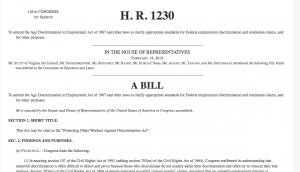On February 14, 2019, Congressman Robert C. “Bobby” Scott sponsored a bill in the United States House of Representatives which would amend the Age Discrimination in Employment (ADEA) laws. Entitled the Protecting Older Workers Against Discrimination Act, the act is a reaction to a Supreme Court ruling issued nearly 10 years ago which was seen as limiting employees ability to prove age discrimination claims. Today’s Long Island Employment Law blog discusses the proposed amendment.
In Gross v. FBL Financial Services, the United Supreme Court considered the standard of proof an employee must show to prove an age discrimination case. The dispute centered on whether employees can show mixed motives or whether an employee must show that discrimination was the but-for reason for an adverse employment action.
In mixed motive cases, an employee can prevail by showing that an employer was motivated, at least in part, by a discriminatory purpose. In other words, the employer may have had many reason to fire or demote an employee, but if discrimination was one of the reasons that motivated the employer to act, and if the employee could prove that, then the employee could win. In but for cases, employees must prove that the employee would not have been fired or demoted in the absence of discriminatory intent.
Congress amended Title VII of the Civil Rights Act to clarify that employees suing for discrimination under Title VII can prove discrimination by using the mixed motives test. Title VII prohibits employment discrimination based on race, national origin, sex, gender, and religion. But, at the time Gross was decided by the Supreme Court, Congress had not made the same amendment to the ADEA. The Supreme Court determined that because Congress did not amend the ADEA, then it presumed Congress intended that age discrimination claims remain subject to the but for analysis.
H.R. 1230 was introduced to address the Gross decision. Indeed, the proposal specifically notes that it’s purpose is to reject the Gross holding and to clarify that mixed motive analysis is the proper standard for age discrimination cases.
Further, the proposal clarifies other points. It ensures that employees may rely on any form of admissible evidence to prove an age discrimination claim, they are not required to show that age was the sole cause of an unlawful employment practice, and employees can use any available method of proof or analytical framework to prove unlawful employment practices.
Notably, the bill was co-sponsored by seven other Congressmen and women, including three democrats and four republicans. Congressman John Katko from New York is a co-sponsor.
The bill has been referred to the house committee on Education and Labor. No further action has been taken on the bill since February, but the employment lawyers at Famighetti & Weinick PLLC will be closely watching the bill’s progress.
H.R. 1230 may have significant impacts for employees seeking to bring age discrimination claims against employers. Age discrimination claims have been notoriously harder to prove since Gross, and the Protecting Older Workers Against Discrimination Act will bring the ADEA in line with other civil rights and employments statutes, such as Title VII. The mixed motives test is considered a lower standard and if the ADEA is subject to a mixed motives analysis, employers may be more inclined to settle age discrimination cases, judges may be less inclined to dismiss age discrimination cases, and jurors will be instructed to use a more lenient standard when assessing if an employee has proven an age discrimination case.
If you have questions about age discrimination in employment, mixed motive or but analysis, proving discrimination cases, or about H.R.1230, contact a Long Island employment attorney at Famighetti & Weinick PLLC. Our phone number is 631-352-0050 and our website is http://linycemploymentlaw.com.

Age Discrimination in Employment
 Long Island Employment Law Blog
Long Island Employment Law Blog

